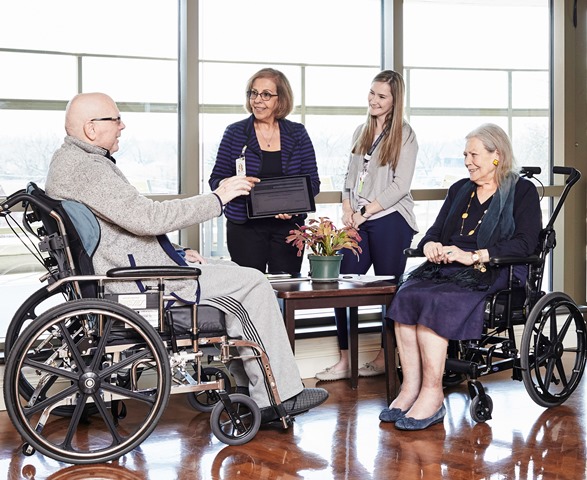By Michael Oreskovich
Infections are the most common kind of complication for hospitalized patients, responsible for thousands of deaths each year according to the Public Health Agency of Canada. Since their prevention is fundamental to patient safety and the recovery process, Runnymede Healthcare Centre has taken steps to strengthen its partnerships with patients and families by increasing access to the hospital’s infection control experts.
Patients and families have always been able to rely on Runnymede’s infection prevention and control (IPAC) team to be there when they need support. In addition to providing in-person consultation upon admission, the team also arranges for patient- and family-focused IPAC education at key points through the year, including at Canadian Patient Safety Week and IPAC Week events. But in late 2017, a new series of meetings was launched that took the team’s engagement with patients and families to a new level.
Bimonthly Patient Family Engagement Committee meetings are held on every floor at Runnymede to give patients and families a chance to meet with hospital staff, and the IPAC team always takes part. “One of our goals is to increase our patients’ and families’ access to the IPAC team so they can share information about infection control and raise awareness about how important it is,” says Raj Sewda, VP of clinical operations and quality, chief nursing executive and chief privacy officer at Runnymede. “The conversations we have at these meetings with patients and families have the potential to save lives.”
These face-to-face meetings have given the IPAC team a new forum for engaging patients and families directly about infection prevention. “The best way to help patients and families understand the importance of infection prevention is through in-person education,” says Catherine Fitzpatrick, Runnymede’s director of flow, quality, pharmacy and privacy. “We see that when this happens, they’re more likely to adopt safe practices.”
An example of this is with Runnymede’s annual flu shot campaign. Every September, the IPAC team raises patients’ and families’ awareness about vaccine safety, explains the risks associated with not getting the flu shot, and takes the time to listen and address their questions and concerns. Importantly, the team also gives patients an opportunity to consent to receive their flu shot at Runnymede, and advises family members on where they can go for vaccination.
The efforts appear to be having a measurable impact. As of January 2019, 71 per cent of patients at Runnymede received the flu shot. According to a 2018 Public Health Agency of Canada report, this is nearly double the national rate for adults. (It helps that the hospital’s staff lead by example: since 2015/16, Runnymede has placed first or second among its peer hospitals in the Greater Toronto Area (GTA) for staff vaccination.)
The meetings also provide patients and families with a chance to offer their feedback on hospital policies and resources around infection prevention. “There’s no better way to evaluate the effectiveness of IPAC education than to get feedback straight from patients and families,” says Fitzpatrick. “Our patient- and family-centred approach often generates fresh new ideas and insights.”
For example, family members with loved ones on contact precautions told the IPAC team that available information about putting on and removing personal protective equipment (PPE) didn’t meet their needs. In response, the team created new PPE instruction signage that contained the level of detail patients and families asked for, and ensured it was widely available on the patient floors. The IPAC team went further by flagging the issue for nursing staff so they were aware of family members’ need for extra support with PPE procedures.
In addition to enhancing safety at Runnymede, the feedback gathered by the IPAC team also serves to improve the patient experience. To help protect patients if an outbreak is declared, the hospital may temporarily restrict the number of visitors to just one per patient. “Our patients told us this had a negative impact on their experience, and they asked if we could do something about it,” says Fitzpatrick. “Non-compliance with infection control procedures clearly wasn’t an option, so we had to dig deeper and be creative with the way we acted on this identified patient need.” The team connected with Runnymede’s activation therapy department, and a solution was developed: By facilitating Skype and FaceTime calls, Runnymede now enables patients to have virtual face-to-face interactions with loved ones when visiting is restricted, all while upholding the hospital’s commitment to safety during outbreaks.
In-person access to Runnymede’s IPAC team members through the bimonthly meetings engages patients and families about infection prevention and underscores its impact on safety and the recovery process. “These meetings have sparked discussions about infection control that might never have happened if we hadn’t created an environment in which patients and families could meet with our IPAC team,” Sewda says. “This is another example of how Runnymede’s staff actively collaborates with patients and families to enhance their experience and make them true partners in their own care.”
Michael Oreskovich is a communications specialist at Runnymede Healthcare Centre.




